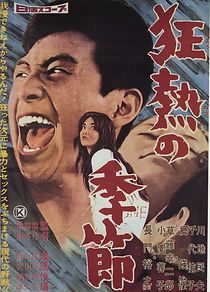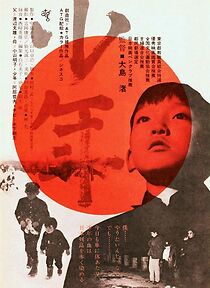Description: The Japanese new wave (Nuberu Bagu) is a group of loosely connected Japanese filmmakers during the late 1950’s & into the 1970’s. Although they did not make up a coherent movement, these artists shared a rejection of traditions & conventions of classical Japanese cinema in favor of more challenging works, both thematically & formally.
Coming to the fore in a time of national social change & unrest, the films made in this wave dealt with taboo subject matter.
Creator: Rodjenka
Posted: 5 years ago
|
|
Favorite
8 favorites
1311 views
|
|

info
|
Movie:
Tattooed Life
( 1966 )
After his own gang sets him up to kill a rival mobster, a hit man is forced to flee with his younger brother.
|

info
|
Movie:
The Insect Woman
( 1963 )
Life story of a woman born in poverty trying to succeed. Through her many schemes, she faces her ups and downs in a cyclical nature, fueled mostly by self-interest.
|

info
|
Movie:
Punishment Room
( 1956 )
Nothing less than a phenomenal, astonishing and pioneering film. This spectacle of an angry, ego-driven youth tormented by his own emotional impotence, low self-esteem and resentment towards his parents.
|

info
|
Movie:
Crazed Fruit
( 1956 )
Spending their summer on an exotic beach, two brothers fall for the same beautiful girl, whose charm and looks may hide more than they they bargained for.
|

info
|
Movie:
Suzaki Paradise: Red Light District
( 1956 )
A couple stand indecisively on a bridge in Asakusa. Tsutae and Yoshiji have lost confidence and passion for their future as they get on the bus for Tsukishima and get off at Suzaki. Across the bridge they see the sign for Suzaki Paradise, a red-light district where Tsutae once worked as a prostitute. Tsutae spots an ad for a waitress at a bar near the bridge and she r...Read all
|

info
|
Movie:
Kisses
( 1957 )
Story of a young couple whose fathers are prison bound.
|

info
|
Movie:
Giants and Toys
( 1958 )
In the middle of a fierce commercial competition among three caramel companies, an executive builds up a ditzy teenage girl as a mascot while simultaneously trying to uncover the rival companies' plans.
|

info
|
Movie:
A Town of Love and Hope
( 1959 )
A young man runs a scam selling pigeons that always return to his home. A rich girl takes an interest in him and tries to help him find a good job.
|

info
|
Movie:
The Sun's Burial
( 1985 )
In Osaka's slum, capricious folks without futures engage in pilfering, assault and robbery, prostitution, and the trading of ID cards and blood.
|

info
|
Movie:
Night and Fog in Japan
( 1985 )
Long takes and a highly theatrical visual approach combine to form a tense and confrontational look at the decline of a socialist student activists' movement in Japan.
|

info
|
Movie:
The Naked Island
( 1962 )
A family of four are the sole inhabitants of a small island where they struggle each day to irrigate their crops.
|

info
|
Movie:
The Warped Ones
( 1960 )
A juvenile delinquent gets out of the pen and causes reckless mayhem, mostly directed at the girlfriend of the journalist who helped send him up.
|

info
|
Movie:
Bad Boys
( 1961 )
An improvisational film depicting life in a boys' reform school.
|

info
|
Movie:
Pigs and Battleships
( 1963 )
A young hoodlum decides to work for a criminal organization that is tearing itself apart.
|

info
|
Movie:
The Catch
( 1961 )
Towards the end of WWII, a black American pilot is captured and imprisoned by rural Japanese villagers, who await official instructions as to how to proceed with their "catch."
|

info
|
Movie:
Pitfall
( 1962 )
A man wanders into a seemingly deserted town with his young son in search of work. But after a bit of bad luck, he joins the town's population of lost souls.
|

info
|
Movie:
She and He
( 1963 )
In a sterile building complex, a woman gains a sense of altruism after encountering a street beggar and his blind orphan, much to her husband's disapproval.
|

info
|
Movie:
Intentions of Murder
( 1964 )
A housewife living under her tyrannical husband has her life stressfully turned upside down after getting raped by a burglar.
|

info
|
Movie:
Assassination
( 1964 )
In 1863, when Americans warships approach Japan, a enigmatic ronin becomes a important figure in a complex game of power between the Shogunate and the empire.
|

info
|
Movie:
Pale Flower
( 1964 )
A gangster gets released from prison and has to cope with the recent shifts of power between the gangs, while taking care of a thrill-seeking young woman, who got in bad company while gambling.
|

info
|
Movie:
Gate of Flesh
( 1964 )
An injured thief on the run finds sanctuary within a brothel of united, ruthless women.
|

info
|
Movie:
Woman in the Dunes
( 1964 )
An entomologist on vacation is trapped by local villagers into living with a woman whose life task is shoveling sand for them.
|

info
|
Movie:
With Beauty and Sorrow
( 1965 )
Long before the events of the movie Ôki, who was approaching middle age, had a relation to 16-year-old Otoko. She got pregnant, but the child was stillborn. Their relation stopped at the same time. Much later Ôki had become a famous writer, not least because of a novel about this love story. Otoko had become a famous painter. But she had never overcome the double earl...Read all
|

info
|
Movie:
A Story Written with Water
( 1965 )
A young man who's about to marry is torn between his fiancée and the love for his mother. His past, dreams and desires unfold simultaneously.
|

info
|
Movie:
The Pornographers
( 1966 )
While avoiding the mob and local authorities, a world-weary pornographer finds being a family man the most difficult as he wrestles with his own desires and afflictions.
|

info
|
Movie:
Violence at Noon
( 1966 )
Two young women must come to terms with the fact that a man they're deeply linked to is a murdering rapist.
|

info
|
Movie:
Fighting Elegy
( 1966 )
During the 1930s, a teenager yearns for a Catholic girl, whose only desire is to reform his sinful tendencies. Hormones raging, the young man channels his unsatisfied lust into the only outlet available: savage, crazed violence.
|

info
|
Movie:
Tokyo Drifter
( 1966 )
After his gang disbands, a yakuza enforcer looks forward to life outside of organized crime but soon must become a drifter after his old rivals attempt to assassinate him.
|

info
|
Movie:
The Face of Another
( 1967 )
A businessman with a disfigured face obtains a lifelike mask from his doctor, but the mask starts altering his personality.
|

info
|
Movie:
A Man Vanishes
( 1967 )
Plastics salesman Oshima disappeared without a word to anyone, and has been missing for two years. Shohei Imamura and his crew follow Oshima's fiancé Yoshie and actor Shigeru Tsuyuguchi as they investigate the disappearance.
|

info
|
Movie:
Branded to Kill
( 1967 )
After a botched assignment, a rice-fetishizing hitman finds himself in conflict with his organization, and one mysterious, dangerous fellow-hitman in particular.
|

info
|
|

info
|
Movie:
Profound Desires of the Gods
( 1970 )
An engineer from Tokyo arrives on a drought-ridden tropical island to drill a well to power a nearby sugar mill. He meets the inbred Futori family, hated by the locals for breaking religious customs.
|

info
|
Movie:
Death by Hanging
( 1971 )
A Korean man is sentenced to death by hanging, but he survives the execution. For the following two hours, his executioners try to work out how to handle the situation in this black farce.
|

info
|
Movie:
Three Resurrected Drunkards
( 1968 )
A carefree afternoon at the beach turns into a comic misadventure when three young Japanese men are mistaken for illegal Korean residents.
|

info
|
Movie:
The Man Without a Map
( 1968 )
A private detective is hired to find a missing man by his wife. Contradictory evidence and the lack of clues soon render the case as virtually unsolvable, as the detective grows more and more frustrated.
|

info
|
Movie:
Eros + Massacre
( 1970 )
Two interwoven stories. The first is a biography of anarchist Sakae Osugi which follows his relationship with three women in the 1920s. The second centers around two 1960s students researching Osugi's theories.
|

info
|
|

info
|
Movie:
Boy
( 1970 )
A young boy reluctantly aids his swindling father in a threatening scam.
|

info
|
Movie:
Diary of a Shinjuku Thief
( 1969 )
Story of a bookstore thief named Birdey who is led through various adventures in Tokyo's Shinjuku district by salesgirl Umeko.
|

info
|
Movie:
Double Suicide
( 1970 )
A doomed love between a paper merchant and a courtesan.
|

info
|
Movie:
Go, Go Second Time Virgin
( 1969 )
After being raped in an unknown rooftop, seventeen year-old girl Poppo meets a mysterious boy, and both share their sexual traumas and fears, with fatal consequences.
|

info
|
Movie:
The Man Who Left His Will on Film
( 1970 )
A metaphysical mystery involving a university student's camera getting stolen, and the thief then committing suicide. Looking back upon the event, the situation comes to be questioned if it happened at all.
|

info
|
|

info
|
Movie:
The Ceremony
( 1974 )
Upon receiving a shocking telegram from his cousin, a man recounts his early life, as a member of a broad family full of dark secrets that slowly reveal themselves through the clan ceremonies.
|

info
|
Movie:
Emperor Tomato Ketchup
( 1971 )
Set in a future in which children have overthrown adults, the film does not have a central narrative. It depicts a series of graphic tableaux in which children engage in cruel and abusive acts against the adults.
|

info
|
|

info
|
Movie:
Summer Soldiers
( 1972 )
A Vietnam veteran deserts from the US Army while on leave in Japan.
|

info
|
Movie:
Dear Summer Sister
( 1985 )
Story is about a Tokyo girl looking round Okinawa island for her long-lost brother and finding he is the tourist guide with whom she has had an affair.
|

info
|
Movie:
Coup d'Etat
( 1973 )
A freestyle biopic of Ikki Kita, the ultranationalist intellectual whose ideas inspired the failed military coup in 1936.
|

info
|
Movie:
Pastoral: To Die in the Country
( 1974 )
A young boys' coming of age tale set in a strange, carnivalesque village becomes the recreation of a memory that the director has twenty years later.
|

info
|
Movie:
In the Realm of the Senses
( 1977 )
A fictionalized retelling of the story of Sada Abe, whose affair with her master quickly turned obsessive and sadomasochistic.
|
|


bobjoneschar : If they can't even harm plants, Humanity would end up lasting less than like twenty-five y...